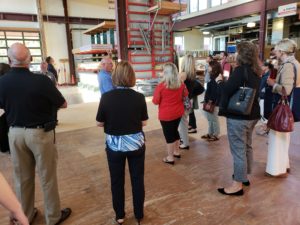Educators get close-up look at construction industry jobs
At a one-day learning session about the construction industry, Greensburg Salem High School teacher Jackie Yuhas said one of the most important things she learned was how to access samples of tests given for admission to the region’s 17 trade apprenticeship training programs.
Yuhas said she’s always wanted to go over a sample so that she could make her lessons more “job oriented” and relevant to the ways students will need to use their learning after they graduate.
That kind of learning is exactly what the Consortium’s Educator in the Workforce series is designed to provide. Piloted last year, the program already has scheduled six immersion opportunities for 2018-2019 that will be similar to the one Yuhas attended in early October. 
Mascaro Construction co-hosted the daylong session at the Carpenters Training Center October 8. Some 70 educators from 21 districts attended. In addition to helping educators connect their subject areas to employer needs, the immersion experiences are intended to showcase different career paths and training opportunities available to students.
John Mascaro, the company’s chief executive told attendees he hoped the event would dispel some common misconceptions about the kinds of careers his industry can offer.
“It’s not just picks and shovels,” he said. “There’s diversity of opportunity second to none. The pathways are limitless.”
Although the industry can provide avenues to well-paying careers for people who don’t want to go to college, Mascaro said those who want degrees are making a mistake to think it has no place for them.
At his own company, whose employment needs are representative of the industry, jobs range from Project Estimators and Project Engineers to Business Developers and the kinds of office jobs that all industries have, including specialists in Human Resources, Information Technology, and Finance, among others.
A number of Mascaro staffers said they had created career paths after joining the company by getting certifications to perform different jobs, like safety inspection or simply by getting on-the-job experience that qualified them for other roles. Many of the certifications can be earned without a college degree.
Mascaro and others on hand from his company, the Builders Guild of Western Pennsylvania and the Keystone Mountain Lakes Regional Council of Carpenters said construction demand and job openings in the region have exploded.
“It’s an unprecedented opportunity,” Builders Guild Executive Director Jeff Nobers said during a breakout session.
He said the building boom has created $6 billion worth of projects this year alone—compared with an annual average of $2.8 billion—and so many jobs the industry is having trouble filling them. With the region still adding to the backlog of building projects and Baby Boomers retiring, employment needs are expected to continue growing at least through the coming decade.
In other breakout sessions, educators learned about the Carpenters apprenticeship program and that it’s only one of 17 different apprenticeship programs the building trades offer in the region.
Industry representatives also emphasized that construction work, whether in the office or in the field, demands the same transferrable, soft skills, such as communication and problem-solving as other industries.
“Some of the biggest losses on the job site are the result of a lack of communications skills,” said Carpenters’ Training Director Rick Okraszewski.
Carrie Vottero, another attendee from Greensburg Salem said she thought the recurring emphasis on “work ethic” was an important take-home for her students. She also found it eye-opening to learn how many opportunities the construction could offer college graduates. “I didn’t think they were looking that much for college degrees.”
In the same vein, Justin Ward, a 5th grade teacher in the Laurel Highlands School District, said the entire event was important to “help break down the stigma” for students who don’t necessarily want to go to college, even if they’re academically gifted, and to help educators, parents and others support them in finding solid career paths that don’t require a degree.
The event “just gave me so many things to think about,” he said. “My mind was going a million miles a minute.”






